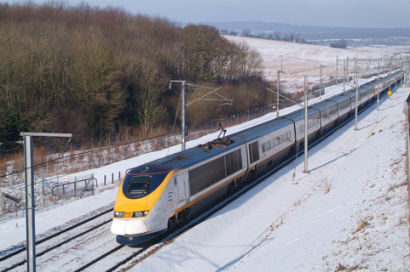THE cost of not building high-speed lines to provide more rail capacity could be huge in terms of having to upgrade existing lines and the loss of economic benefits, transport minister Lord Adonis has warned.
The man who Gordon Brown has appointed to be in charge of major transport infrastructure projects made his comments in a major speech entitled ‘Time For High-Speed Rail?’
He accepted there was a high price for building new lines, but noted the experience of the 10-year plus project to upgrade the West Coast main line, which had just been “painfully completed”.
Lord Adonis said “an essentially patch-and-mend approach was adopted, to secure a transformation in capacity and service quality for much less than the cost of building an entirely new line”.
And while many benefits had been secured, and passengers had never had a better service, “it has not been an easy journey”.
The original mid-1990s spec was for a £4 billion upgrade to provide greater capacity, 140mph running and state-of-the-art signalling, as on High Speed One.
But the cost ended up at £8.8 billion for a ‘de-scoped’ project for 125mph running, new signalling postponed and capacity enhancement very much less than a new line would have achieved.
“Although there is a high price involved in building high-speed lines, there is also a high price involved in not building them when additional rail capacity is required anyway.
“This high price is measured not only in lost economic and social benefit but also in the direct cost of upgrading existing congested rail lines, which is very large indeed.
“For the future, we need to assess the relative merits, including money saved, of building new lines rather than highly disruptive and expensive major upgrades of existing lines.
“The Government projection is for a doubling of passenger demand by 2030. How far, on congested lines, growth is met by incremental upgrades, and how far by new lines, is a critical issue which will determine the development of commuter as well as high-speed lines.
“If the cost of disruption is fully taken into account, I suspect it is by no means clear that ostensibly lower-priced upgrades are always better value than new lines including new high-speed lines.”
Lord Adonis said HS1 works as well as any high-speed line on the planet, showing that Britain could provide world-class infrastructure to world-class standards.
It was in that spirit they had asked HS2 to propose a high-speed plan for a London-West Midlands line, with advice on possible extension to the great conurbations of the North West, West Yorkshire, North East and central Scotland.
Lord Adonis said high-speed rail was growing not only in France and Japan, but across Europe and Asia, while there were now schemes proposed in the US and Canada.
“This international experience is having a major impact on my thinking and that of the Government,” he said.
“In my view it is no longer a defensible position to oppose high-speed rail on the grounds of English exceptionalism.
“I saw somewhere recently the argument that we have less to gain from high-speed rail because our cities are closer together than those in France. This is frankly comical.
“We need to engage systematically with the experience of countries making a success of high-speed rail, and learn from it, which is currently what we are seeking to do.”
Liberal Democrat transport spokesman Norman Baker said: “The costs of high-speed rail have often been over-estimated while the cost of the West Coast main line upgrade was excessive.
“Those who are opposed to high-speed rail need to think again – but it is essential that building high-speed rail is in addition to improving our local rail services. We need a real renaissance in our railway.”
Arguments against high- speed lines are ‘comical’ says transport minister
1st April 2009


